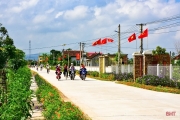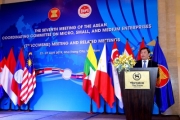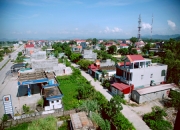Practice

Properly handling the relationships in building new rural area today
(LLCT) - The National target program on building new style rural area has contributed to changing the face of rural areas in Vietnam. Besides the achieved results, the program still face problems that need to be settled, including the relationships in new-style rural area building. Those are the relationships between the State, social forces and farmers; between the State’s “seed funding”, the “inner” capacity of the people and other social resources; and between the State, market and society, and between “soft criteria” and “hard criteria” of new rural areas.

Improvement of Vietnamese small and medium enterprises competitiveness in international integration
(LLCT) - In recent years, small and medium enterprises in Vietnam have made important contributions to the economic development of the country. In particular, they account for over 40% of GDP, creating jobs for 62% of the total national labor force etc. However, they still retain limitations, such as low capital, low level of management, use of manual laborers, outdated production technology lines, or lack of competitiveness. Therefore, to enhance their competitiveness, it is necessary to create a favorable business and investment environment; support them in innovation, creation, modernization of technology and development of human resources; boost labor productivity; improve the effectiveness and efficiency of State management, and so on

Some recommendations for efficient performance of Vietnamese State-owned economic groups
(LLCT) - In the area of state-owned enterprises (SOEs), state-owned economic groups (SEGs) play an important role, especially in the current context of Vietnam’s economy. The practical operation of SEGs in the last 10 years has reached a number of outstanding and important achievements contributing remarkably to the socio-economic development of Vietnam. However, the SEGs still have many weaknesses and limitations, which are pressing Vietnam’s society. The Resolution No.12-NQ/TW dated June 3, 2017 by the 5th Plenum of the 12th Party Central Committee on continuing to restructure, innovate and improve the efficiency of SOEs stated that: “... to focus on the definitive reasons and solutions for the inefficient performance and prolonged losses of the economic groups, state-owned corporations, projects and investment projects of SOEs”, and by 2030 “to consolidate and develop a number of large-scaled state-owned economic groups for more efficient operation and better capacity to compete regionally and internationally in a number of key economic sectors and fields”.
This article is to present some recommended solutions for better and more efficient operation of Vietnamese SEGs, contributing to the successful implementation of Resolution No. 12 of the 5th Plenum of the 12th Party Central Committee.

Economic growth and social progress in Ho Chi Minh City
(LLCT) - For more than 30 years of renovation, Ho Chi Minh City has recorded great achievements in economic growth and social progress which is reflected in the growth of GDP, average income, healthcare, employment, hunger elimination, and poverty reduction, etc. However, conflict between economic growth and social progress is rising, especially the broadening gap between the rich and the poor, and the increasing numbers of unsolved social problems. With an analysis of the situation, the article offers possible solutions to better solve the relationship between economic growth and social progress in the City in the coming time.
The gender gap in access to development resources in rural areas of developing countries
(LLCT) - This article analyzes the gender gap in access to development resources in rural areas, including the access to land, education, labor markets, finance, and technology. By the overview method, the article clearly shows that women are disadvantaged in accessing resources. Gender stereotype is one of the reasons for the gender gap. Hence, empowering women is necessary in order to prevent this practice.

Environmental degradation and sustainable development for ethnic minority and mountainous areas
(LLCT) - In the process of the socio-economic development of our country, the rapid and sustainable growth of the economy must be supplemented with quality handling of equity issues, social progress, and eco-environmental protection. This article addresses the impacts of environmental degradation on the socio-economic changes of ethnic people in ethnic minority and mountainous areas and proposes solutions which would allow for the effective and safe use of natural resources, ensuring sustainable development.

Promoting the affect of property and income declaration in fighting against corruption
(LLCT) - Fighting against corruption is an activity of great concern for all nations in the world. In Vietnam, the fight against corruption is prioritized by the Party and the State in all viewpoints and guidelines as well as institutionalized in all policies and laws in accordance with the tendency of the age and national development. In the anti-corruption regime, the Party and the State have implemented many solutions, including property and income transparency; however, in reality, there are still many shortcomings in the implementation of these policies. This article mentions the current laws and regulations and puts forward recommendations on property and income declaration so that they can be more effective and efficient in corruption prevention and combat.

Religious organizations’ participation in protecting the environment and coping with climate change in Vietnam
(LLCT) - In order to make practical contributions to protecting the environment and coping with climate change, in 2015 Vietnam deployed a coordination program between the Vietnamese Fatherland Front, the Ministry of Natural Resources and Environment, and religious organizations. So far, the program has attracted the participation of millions of followers of 14 religious organizations and established 322 models of religions protecting the environment and coping with climate change. Based on this practical experience, this article seeks to help clarify the scientific basis of religion in protecting the environment and coping with climate change, especially since religion has the following useful functions: 1) controlling society; 2) uniting society; 3) participating in and dealing with social issues; 4) socializing individuals; 5) building belief.

Fighting against loss of state budget in the context of implementing free trade agreements
(LLCT) - : Strengthening collection and fighting against the loss of state budget (SB) revenue is a crucial task of the Customs sector, contributing to the implementation of Resolution No. 01/NQ-CP dated 1 January 2018, Resolution No. 23/NQ-CP dated 8 April 2018 of the Government on solutions to manage the implementation of the socio-economic development plan. Facing the strong influence, impact of Free trade agreements, in 2018, the Customs sector has made efforts in developing solutions to strengthen the revenue of SB in 2018, reaching targets and completing political tasks.

Some typical examples in implementation of Democracy law at grassroots level
(LLCT) - Over the past 10 years of implementing the ordinance on democracy at grassroots level, there have been many typical examples and good practices. The article herein mentions some typical examples and lists experiences learned in order to properly implement the democracy law at grassroots level in the coming time.
Journal Archives
Journal Archives
Media
Photo Gallery
Contact us

 Practice
Practice


